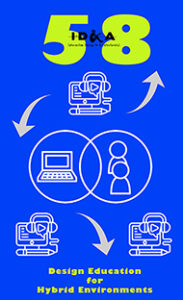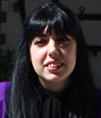(https://doi.org/10.55612/s-5002-058)


Ilhan Aslan
is a senior research scientist at Huawei Technologies, where he leads an HCI team and manages the Affective Computing & HCI Innovation Research Lab. His research focus is at the intersection of HCI and Affective Computing, exploring the future of human-centred multimedia and multimodal interaction. He received the Diploma in 2004 from Saarland University in Germany and the Doctoral degree in 2014 at the Center for HCI from Paris-Lodron University Salzburg in Austria. He was a researcher at the German Research Center for AI and the Fraunhofer for Cognitive Systems, and akad. Rat (∼assistant professor) at Augsburg University in Germany before joining Huawei in 2020.

Gökçe Elif Baykal
is an Assistant Professor at the Department of Communication Design at Özyein University, Istanbul. She holds PhD in Design, Technology & Society from Koç University. Her research focuses on incorporating developmental and educational theories in interaction design methods in child-computer interaction.

Ana Bilandzic
is a user experience researcher working for the CyberSolutions GmbH as part of Hubert Burda Media in Munich, Germany. Ana graduated with a PhD from Queensland University of Technology, Brisbane, Australia, in 2021. Her thesis, “The Rise of Casual Creative Environments: Towards a Socially Embedded View of Innovation Precursors and Processes” asked the research question: What are the precursors to innovation in Casual Creative Environments, and what are their impacts on innovation processes and outcomes? Her background is in business administration with majors in market-based management, and innovation and information. She received her Bachelor of Science degree from the University of Passau and her Master of Science degree from the Philipps-University of Marburg, Germany. During her master and bachelor studies, she gained experience from completing national and international internships, working student positions and studies in Germany, Croatia, and Sweden.

Vanessa Cesário
Research Scientist, holds a PhD in Digital Media with a focus on Technology and Human-Computer Interaction (HCI). Her specialty underscores the importance of ethical considerations in IT implementation. She has made significant contributions in HCI, especially as applied to cultural heritage. Currently, she’s crafting immersive experiences by blending game design, storytelling, and participatory design. As a faculty member at the Interactive Technologies Institute (ITI) within IST University of Lisbon, her collaborations with global institutions have broadened her research horizons. With a diverse portfolio, Vanessa explores areas like HCI, Gamification, Co-design, and Children’s Interaction within Museums, always aiming to craft profound cultural experiences.

Brendon Clark
is an Associate Professor in Design Anthropology at Umeå Institute of Design, Umeå University. His research and teaching focuses on emergent practices through sociomaterial interactions, with emphasis upon the improvisational and performative aspects of the design encounter.

António Coelho
belongs to the Department of Informatics Engineering at FEUP. Beyond his academic commitments, he’s recognized as a Senior Researcher at INESC TEC, where he specializes in Computer Graphics and Virtual Environments. His work bridges the gap between theoretical research and real-world applications, pushing the boundaries of digital innovation.

Giuseppe Corbelli
is a doctoral candidate in Mind and Technologies in the Digital Society at Uninettuno University, Faculty of Psychology, Italy. His main research interests are related to the quantitative analysis of self-regulatory processes from a social cognitive approach, focusing in particular on response inhibition and the interplay between controlled and automatic decisions. Currently, he is investigating the cognitive processes related to online misinformation through an agentic perspective.

Georgios A. Dafoulas
is a Professor of Information Systems and Business Computing in the Department of Computer Science at Middlesex University’s Faculty of Science and Technology. He has studied Computation, Business Management and Education at post graduate level and has been awarded a Principal Fellowship from UK’s Higher Education Academy. He is the department’s Director of Programmes for the Business Information Systems cluster and has been awarded a Senior Teaching Fellowship for his innovative work on technology assisted learning. He leads the Management and Collaborative Information Systems teams and coordinated the establishment of the TIME-CUBE technological entrepreneurship and innovation hub in Hendon, London. His research focus is on investigating the role of information systems in educational contexts, e-learning technologies, and computer-supported cooperative work, as well as the impact of digital technologies in business environments. His research output includes more than 200 publications including books, journal and conference papers, technical reports, handbooks, and guidelines. He serves as a member of several editorial and review boards and has been invited to deliver keynotes for international scientific events in the fields of computing, business, and education. He has been involved in and managed more than 40 externally funded projects for EU, AUNP, Erasmus+, Jisc, and DTI.

Eva Eriksson
is an associate professor at Aarhus University in Denmark, with a PhD from Chalmers University of Technology in Sweden. Eva specializes in interaction design methodology including participatory design, and in designing interactive technologies in both formal and informal educational contexts.

Ylva Fernaeus
is an Associate Professor in Interaction Design at KTH Royal Institute of Technology, and at Umeå Institute of Design, Umeå University. She has 20 years of experience teaching in the fields of interaction design, with specific focus on tangible and embodied experience, and hybrid crafting as a careful, playful and critical practice.

Marcus Foth
is a Professor of Urban Informatics in the School of Design and a Chief Investigator in the QUT Digital Media Research Centre (DMRC), Faculty of Creative Industries, Education, and Social Justice, Queensland University of Technology, Brisbane, Australia. For more than two decades, Marcus has led ubiquitous computing and interaction design research into interactive digital media, screen, mobile and smart city applications. Marcus founded the Urban Informatics Research Lab in 2006 and the QUT Design Lab in 2016. He is a member of the More-than-Human Futures research group. Marcus has published more than 270 peer-reviewed publications. He is a Fellow of the Australian Computer Society and the Queensland Academy of Arts and Sciences, a Distinguished Member of the international Association for Computing Machinery (ACM), and currently serves on Australia’s national College of Experts. His co-authored/edited books include Designing More-than-Human Smart Cities: Beyond Sustainability, Towards Cohabitation (Oxford University Press, 2023); Digital Participation through Social Living Labs – Valuing Local Knowledge, Enhancing Engagement (Chandos, 2018); Citizen’s Right to the Digital City: Urban Interfaces, Activism, and Placemaking (Springer, 2015); Eat, Cook, Grow: Mixing Human-Computer Interactions with Human-Food Interactions (MIT Press, 2014); Street Computing: Urban Informatics and City Interfaces (Routledge, 2014); From Social Butterfly to Engaged Citizen: Urban Informatics, Social Media, Ubiquitous Computing, and Mobile Technology to Support Citizen Engagement (MIT Press, 2011).

Stefan Grafberger
is a Ph.D. student at the University of Amsterdam, conducting research at the intersection of data management and machine learning. Previously, he interned at Microsoft, Amazon, and Oracle Labs, and worked as a research assistant in the database group at TU Munich. Before his Ph.D., he did his master’s in Software Engineering at TU Munich, LMU Munich, and University of Augsburg.

Marlene Hasle
holds a master degree in Pedagogy from University of Oslo, Department of Education. She has worked for “Sykehuspartner” developing content for learning, including design, manuscripts, production of video and other audio-visual content, as well as interactive material for the heath sector.

Greg Hearn
is Research Professor in the School of Design at QUT. His research examines social, business and future workforce issues in the adoption of innovation. He is a lead researcher in the Advanced Robotics for Manufacturing Hub and a Chief Investigator in the ARC Training Centre for Collaborative Robotics in Advanced Manufacturing.
His co-authored books include The future of creative work: Creativity and digital disruption (Edward Elgar, 2020); Creative graduate pathways within and beyond the creative industries (Routledge, 2017); Creative work beyond the creative industries (2014: Edward Elgar); The knowledge economy handbook (Edward Elgar, 2005 and 2012); Knowledge policy: Challenges for the 21st century (Edward Elgar, 2008).

Mojgan Jadidi
is an Associate Professor of Civil Engineering at Lassonde School of Engineering, York University. Her research interests include geospatial visual analytics, quantum computing, Building Information Modeling (BIM), 3D GIS data, sensors data integration, Digital Twins, and virtual and augmented reality application developments for better and informed decision-making in the context of smart buildings, infrastructures and cities. She is currently the associate Director of ESRI Center of Excellence at York University. She is serving as secretary of the International Society for Photogrammetry and Remote Sensing Commission IV Working Group 9 (ISPRS CIV/WG9) Spatially Enabled Urban and Regional Digital Twins. She is also an IEEE member Women in Engineering and Geoscience group since 2014.

Anders Kluge
is a researcher at Department of Education, University of Oslo, Norway. He has been working with technology in applied and basic research and are now mainly studying the use of different digital representations in schools, including simulators, augmented reality, and games. He is the author of the textbook “Learning with digital technology” from 2021 (currently only available in Norwegian), and holds a dr.scient degree in Informatics from the University of Oslo.

Maximilian Kuschewski
is a Ph.D. student at the Technical University of Munich, researching efficient query processing, modern NVMe SSDs, and cloud-native data analytics with Prof. Viktor Leis. He received his M.Sc. from the TUM, LMU, and the University of Augsburg in 2020 and his B.Sc. in Computer Science and Engineering from the University of Augsburg in 2018.

Bahareh Langari
was awarded his doctoral degree in electrical engineering, with a thesis on ” Multi-Scale Edge-Guided Image Gap Restoration,” from Brunel University, London, UK. Holder of a BSc in Computer Engineering and an MSc in Data Communication Systems from Brunel University. Her area of expertise includes signal processing, programming, data analysis, and software development. Dr Bahareh has contributed to over ten publications, including transactions. She is currently an academic assistant in the School of Science and Technology at Middlesex University. She is teaching in the field of Business information systems and database systems. She has been involved in a few EU-funded projects, and currently, her research focus includes video tagging and emotion detection in educational institutions.

Kajal Mistry
(BSc, MSc and AFHEA) is an Academic Assistant and a PhD student within the Computer Science department at Middlesex University UK. She has won several awards including the BCS computing project award. Her personal research is in technology use in different fields especially in learning environments, her PhD is focused on enhancing student experience in HE which incorporates Eye-Tracking technology.

Giacomo Nalli
is a Lecturer in Computing Science at Middlesex University. He earned a Ph.D. in Computer Science at the University of Camerino, where his research focused on the development of machine learning applications for e-learning courses. His research experience, consisting in the development of artificial intelligence solutions aimed at improving university teaching, has led him to achieve several important results which converged in fundings, scientific articles and participation as a speaker in international conferences.

Dominik Neu
is a Software Engineer with a focus on native app development. He is working for the German public broadcasting network ARD in the role of Android team lead. Previously, he interned at SAP in Walldorf, SAP France in Paris, and Oracle Labs in Zurich. He holds a M.Sc. in Software Engineering from Technical University of Munich, Ludwig Maximilian University of Munich and University of Augsburg, and a B.Sc. in Media Computer Science from RheinMain University of Applied Sciences in Wiesbaden.

Daniela Neupert
is a Machine Learning Engineer, working and doing research on large transformer models for data-driven weather forecasting at Jua.ai. Previously, she interned at Oracle, visited MIT for research in autonomous driving, and worked at appliedAI. She holds a Master of Science in Software Engineering from the Technical University of Munich, Ludwig Maximilian University Munich, and the University of Augsburg.

Marinella Paciello
is Associate Professor of General Psychology at International Telematic University UNINETTUNO, Faculty of Psychology, Italy. Her research interests are mainly related to the cross-sectional and longitudinal impact of personality dimensions on aggressive and prosocial behaviors. Most of her studies focused on the role of social-cognitive processes leading to misbehaviors in different domains of human functioning such as online and educational settings. She has extensively investigated the role of social-cognitive processes fostering misconduct and the role of self-regulative capabilities in promoting positive adjustment. She authored/co-authored several studies in peer-reviewed journals resulting from different interdisciplinary and international collaborations aimed to understand why people might behave unethically and how we can prevent this.

Dimitrios Papanikolaou
is an architect, engineer and researcher interested in the application of information and communication technology in architecture, human ecology, and urban logistics from a complex systems perspective. He is currently an Assistant Professor at the School of Architecture of the National Technical University of Athens and he has been an Assistant Professor at UNC Charlotte where he founded and directed the Urban Synergetics Lab, an interdisciplinary collaboration between the colleges of Arts and Architecture and Software and Information Systems. Dimitris holds a Doctor of Design (DDes) from Harvard University Graduate School of Design, an MSc in Media Arts and Sciences from the MIT Media Lab, a SMArchS in Design Computation from MIT, School of Architecture and Planning, and a Diploma in Architectural Engineering from the National Technical University of Athens in Greece.

Pascal Pfeil
is an Applied Scientist at AWS Redshift and holds a MSc in Software Engineering from Technical University of Munich, Ludwig Maximilians University Munich and University of Augsburg. His research mainly focuses on database systems. Previously, he interned at Google, Amazon, Snowflake and Oracle, and did a research visit at MIT Computer Science and AI Laboratory.

Alessandro Pollini
is Researcher in Industrial Design with a background in interaction design, human-computer interaction and cognitive ergonomics. During his career he has developed an interdisciplinary practice by structuring the design activity in multiple areas, from user research, ergonomics and cognitive sciences; to theories and methods of digital product design and software engineering. His focus is on the design of interactive and relational products and services and on the functional, formal and use implementation of technology, dealing with the holistic, distributed, embodied and situational nature of people experience. His current research areas are Sustainable Interaction Design (SIxD) and computing within limits; Human-Machine Interface and human-centred automation; and Human Factors in Cybersecurity.

Mariana Ribeiro
has always been captivated by video games. Her linguistic passion led to a Bachelor’s in Applied Languages, focusing on translation. This intrigue evolved into a Master’s in Multimedia, narrowing down to video game storytelling and localisation. For Mariana, game immersion is twofold: a captivating narrative and meticulous localisation. Presently a German Content Reviewer, Mariana utilizes her language prowess daily. Yet, her ambition is to be directly involved in video game creation, bringing her ideas to fruition.

Peter Ruijten-Dodoiu
is an Assistant Professor on Human-Like Machines within the Human- Technology Interaction research group at the department of Industrial Engineering and Innovation Sciences. His research focuses on social- and cognitive psychology, people’s responses to new innovative technologies, and persuasion.

Giorgia Saleri
is a licensed psychologist who currently works in the branch of human resources as a recruiter and administration expert. After completing her studies in cognitive processes and technologies with honors, Giorgia embarks on a professional internship as a researcher at the faculty of psychology of the International Telematic University Uninettuno (Rome). Here Giorgia shows a peculiar interest for several themes like the relationship between decision-making processes and technologies; moreover, Giorgia demonstrates great enthusiasm for the area of moral disengagement and affordance

Farzad Tahmasebi Aria
is an academic assistant in the Department of Computer Science at Middlesex University’s Faculty of Science and Technology. He has studied computing, Marketing and Business Management and has many years of experience in the industry and academia.

Olof Torgersson
is an Associate Professor of Interaction design at the Department of Computer Science and Engineering at Chalmers University of Technology and University of Gothenburg. Originally a computer scientist, Olof has worked with research and teaching dealing with a range of topics from logic programming, through medical informatics to design for mobile devices and co-located interaction supported by technology.

Ariadni Tsiakara
has sixteen years of experience working as a senior IT analyst in industry. She has been involved in international projects working from both Belgium and Greece in areas such as national taxation systems and telecommunication solutions. Her post graduates studies included research in data analytics for educational contexts, where she created an innovative framework for the integration of learning analytics in higher education institutions. She is lecturing in the field of database systems and works on research in the field business intelligence of educational institutions. She has been involved as a project officer and trainer in ten EU-funded projects, and is currently leading the support of dashboard design for a number of research and teaching initiatives

Muhammad Usman
is an Assistant Professor in the Department of Information and Computer Science at King Fahd University of Petroleum and Minerals. He is also an affiliated fellow with the SDAIA-KFUPM Joint Research Center for Artificial Intelligence (JRCAI). He received his PhD degree (2020) and MSc degree (2016) in Computer Science from York University. His research interests include crowd simulation and modeling, human-centered AI, crowd behavior dynamics, immersive technologies for crowds, educational learning and GIS, and spatial visualizations.

Aman Usmani
is a Software Engineer in the Digital Twin. He holds a Master’s degree in Geomatics from York University. His research interests include achieving semantic interoperability of heterogeneous geospatial domains, BIM and GIS, integrated with IoT data using Semantic Web technologies, Digital Twins, and game engineering.

Nico Weise
is a Software Engineer at Google. Previously he worked as a research assistant in the Software and Computational Systems Lab at LMU Munich. He holds a Master of Science in Software Engineering from the TU Munich, LMU Munich, and the University of Augsburg.
